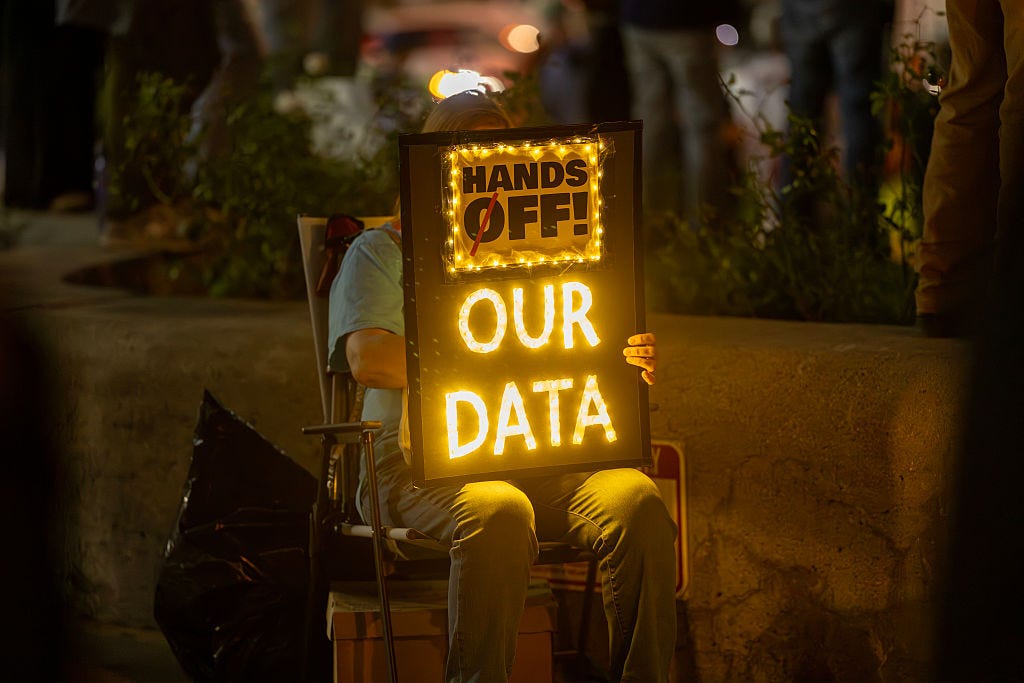Your Data in DOGE’s Hands
Sometimes it’s better if government agencies can’t talk to each other.
In its attempt to remake the federal bureaucracy, the Trump administration appears guided by three imperatives: Eliminate programs and agencies that do not fit into its agenda; exercise direct control over the remaining agencies; and enforce policies by coordinating across agencies. Political scientists sometimes refer to America as a “many-handed” state, where one hand does not necessarily know what the other hand is doing. The new goal is to punch towards a common opponent and throw multiple haymakers at once.
A key element of this strategy is increased data-sharing between federal agencies. For example, the Internal Revenue Service (IRS) will now cooperate directly with Immigration and Customs Enforcement (ICE) to track down undocumented immigrants. ICE officers will be able to share the names of individuals with the IRS, which will then return a list of addresses and allow ICE officers to perform targeted local raids. IRS engineers have also begun working with staffers from the newly formed Department of Government Efficiency (DOGE) to build a new data-sharing interface that would give other federal agencies automated access to different taxpayer datasets.
At the same time, the Trump administration is leveraging federal data to make life less palatable for immigrants in the United States. Immigration authorities asked the Social Security Administration (SSA) to add 6,300 new names to one of the most important federal datasets: the so-called “death master file,” containing more than 94 million names of deceased individuals whose Social Security Numbers are no longer eligible to receive benefits. Data-sharing between immigration authorities and the SSA will initially focus on “terminating” the financial lives of individuals whom the Trump administration considers criminals or terrorists living in the United States. But it could broaden, according to government officials, to include anyone suspected of lacking proper documentation.
At the Department of Housing and Urban Development, meanwhile, officials are merging federal datasets—again with the help of DOGE staffers—to identify so-called “mixed-status” households in which some family members have legal status while others are undocumented, in order to ban them from receiving public housing benefits.
It used to be said that those who control the security forces control political power. Today, that power seems to lie disproportionately with those who control personal data. “Sysadmins”—workers who manage the vast troves of information that are under corporate or governmental control—have emerged as newly empowered operatives of the state.
Data-sharing between government agencies is one of DOGE’s key objectives. And in many ways, updating the handling and distribution of federal data is a noble endeavor. Much of the U.S. government runs on outdated legacy technologies, and (according to a 2023 brief from the American Economic Association) government data “could serve policymakers and the public better if not for … agencies’ uneven access to key source data.”
But data sharing is also a potent weapon—or, rather, a key tactic in the weaponization of bureaucratic agencies as ideological enforcers. The biggest threats to privacy in the twenty-first century often do not come from the collection of any specific piece of information; they come from data linking. Information that was collected for a particular purpose by one organization can be used for a very different purpose by another organization, especially when it is merged with other data into a detailed personal profile. Individuals end up, in effect, with a digital twin, assembled from the informational footprints they leave behind.
In recent years, the role of the villain in this story has most commonly been played by large tech companies. As discussions of “surveillance capitalism” proliferated, so have stories about retailers inferring a girl’s pregnancy before her parents learned about it, or about the difficulties involved in making oneself invisible to Amazon’s watchful eye.
In comparison, information collected by the U.S. government remained relatively siloed.
Federal officials have long made a promise of confidentiality—that your personal data will be handled with care and will not be freely shared with other agencies—in part because mistrust in the bureaucratic handling of personal data increases the rate of tax evasion and reduces the accuracy of the Census. If people worry about the use of tax records by law enforcement, not filing a tax return can become a rational choice.
Crucially, this state of affairs was as much the result of custom as it was of statutes. Many federal agencies are under a mandate to prevent the use of official records in ways that could target specific individuals—but they still retain a large amount of discretionary authority to decide how, when, and with whom their records are shared. It’s just that they have, for the last one hundred years, chosen not to test the limits of that power.
This paradigm first emerged in the early 20th century. At that time, the U.S. government collected much less information about its citizens and non-citizens, but also shared this information much more freely. Women’s groups asked the Census Bureau for lists of local female residents. Industry groups requested business records. And during World War I, the Census Bureau worked with the Justice Department to identify individuals who were suspected of falsifying their ages to avoid the draft. If you asked for data, you stood a reasonably good chance of getting it.
This changed in large part because the public came to regard the Census with a considerable amount of suspicion and did not trust enumerators to handle their personal data with care. When the Census Bureau considered adding questions about personal finances and medical conditions, newspapers condemned the initiatives as a “new inquisition” and “a monstrous oppression.” Concerned lawyers organized a nationwide campaign that advised Americans to simply ignore the questions, and several members of Congress branded census questions about poverty and criminal records as “unwarranted and unconstitutional” because they could be used to aid the prosecution of petty crimes among their constituents.
Many American progressives of that era had initially been skeptical of, as the influential philosopher John Dewey put it, “all the early Victorian political platitudes” about individual rights and governmental overreach, and they had largely dismissed the idea that “liberty of thought and speech” could be permanently damaged by an overbearing state. In their eyes, the American government needed to be as assertive as it could be to address social inequalities and break up powerful monopolies.
But the experience of wartime censorship (and, later, of widespread police raids during the Prohibition Era) led progressives like Dewey to rediscover their liberal inclinations. Increasingly, legislative and regulatory constraints on the exercise of state power seemed like necessary protections against a state apparatus that was not just significantly larger than during the late nineteenth century but also significantly more capable of collecting, analyzing, and utilizing personal data.
In 1900, the Director of the Census still agreed to furnish the “name, age, sex, color, race, and birthplace of individuals” when government officials asked. But by 1930, the Attorney General declared that address data should not be shared with other federal agencies. In 1941, the Census Bureau refused to release information about Japanese-Americans to the Department of Justice. And in 1947, it denied requests for information about suspected Communist sympathizers, which had been sought by organizations like the House Un-American Activities Committee.
This paradigm was eventually formalized with the Privacy Act of 1974, which enjoyed bipartisan support and imposed additional limits on the handling of personal data by federal agencies. The law was a trade-off of sorts, balancing an administrative desire for detailed personal and statistical data against citizens’ expectations of privacy. As a result, during the routine course of government business state officials tended to do less than the law would conceivably allow them to do, and less than they were operationally capable of doing.
The belief that codified restrictions and institutional restraint are necessary to protect privacy has for some time been at odds with the ambitions of Silicon Valley, where personal data flows much more freely. It is therefore unsurprising that attempts to remake the administrative state are often led by DOGE staffers with a tech industry background. In the digital economy, data-linking is often welcomed by consumers, as digital services function better when data is shared across platforms. (If you used an online service to file your taxes this year, you will have undoubtedly noticed this: The filing process can be considerably sped up by allowing the tax software to pull data from financial services companies.) As the writer Franny Choi once put it, “truth is, I wanted to be known, cracked open by gentle hands.”
But transposing the info-politics of Silicon Valley onto public administration—and deploying personal data in a distinctly punitive fashion or towards narrow partisan ends—not only upends a century of precedent: it also threatens to undermine basic norms of American governance. Yes, siloed data can compromise the ability of the American state to deliver services and solve problems. But sometimes friction is a feature, not a bug. Impeding the flow of personal data is one tool that democratic institutions have at their disposal to protect the privacy of individuals. By doing so, they reinforce the principle that personal liberty is paramount.
Martin Eiermann is a sociologist focused on the politics of personal data. His forthcoming book, The Limiting Principle, examines the social and political significance of privacy in the modern United States.
Follow Persuasion on X, LinkedIn, and YouTube to keep up with our latest articles, podcasts, and events, as well as updates from excellent writers across our network.
And, to receive pieces like this in your inbox and support our work, subscribe below:






Government databases should be able to exchange data when exchange of data is necessary for the department, agency, administration, etc. to conduct its business. However, I would be more comfortable if DOGE were an actual department created by Congress. Departments created by Congress are subject to congressional oversight admittedly a task that Congress does not always do or do well.
Sometimes it’s better if government agencies can’t talk to each other.
Maybe.
The human construct of privacy in the declaration of human rights said.. “No one shall be subjected to arbitrary interference with his privacy, family, home or correspondence, nor to attacks upon his honour and reputation.” Note that privacy is not the right but rather arbitrary interference.
In the US the controlling law is Griswold v. Connecticut, which fundamentally says what you do in your home or bed room is your business.
These concepts have been broadly spread into a fantasy of multi definitional rights to privacy. The failure of the Social Security Administration to de-duplicate the social security list should be criminal incompetency, not a privacy concern, nor should cross referencing the SS files to IRS records to find further fraud. And I would further hope he is given the task of looking into the Medicare, Medicaid records and bring to light the financial maggots that rot those systems. No one should object, and should be thankful someone of Musks skill and talents is looking into this.
John Dickerson Read →